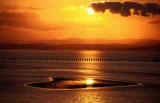"Edinburgh at War" 1939 - 1945 |
|
Thank you to George Smith, British Columbia, Canada, formerly Edinburgh, for the following fascinating collection of memories of Edinburgh at War. George describes these as "Random recollections from Edinburgh". George remembers: |
|
Air Raids "September 1939: intense aerial activity on a sunny day. Everything that could fly seemed to be in the air against threat of the first air raid of the war. Most activity around Forth bridge and Rosyth." "Police boxes with sirens atop; the scary sound of the warning signal." |
| "Schools closed but ‘group teaching' in private homes by a visiting teacher; this did not last long and schools re-opened early in 1940 Brick built air raid shelters in the playground (Craiglockhart Primary)." "Having lunch in a ‘British Restaurant’ in a converted church opposite Fountainbridge Brewery. This was also a central kitchen for school dinners. "Hearing news of the D-Day landings at school and commemorating this by all the class signing the Black out screens around the windows of a classroom" "Slateford school utilised as an AFS (Auxiliary Fire Service) station" |
|
Planes and Barrage Balloons "Hearing ammunition exploding in a crashed RAF bomber which fell at the canal side near the footbridge at the south end of Alan Park Road." "Cycling to Turnhouse to watch planes land and take off. The road from Maybury to Kirkliston was blocked by a military barrier at Turnhouse. Aircraft seen Hurricanes, Spitfires and bright yellow training aircraft and the odd Anson." "Huddling in an Anderson shelter and seeing an aircraft on fire in the night sky somewhere over Kirknewton; believed to be German aircraft on its way to or from Clydebank." "Barrage balloons around the Forth bridge and the spectacle of some of them falling in flames having been struck by lightning one evening." |
|
Pill Box "A pill box - a brick built strong point - camouflaged by painting it to look like a small shop. This was situated opposite the main entrance to Saughton Park and commanded Gorgie Road and Balgreen Road junction." |
|
Comment from Ken Smith |
||||||
I'm pleased that
George included his pill box recollections above. The comment
was read by Ken Smith, formerly of Whitson, Edinburgh who emigrated
to Calgary, Alberta, aged 17 in 1948. Before finding the
comment above, Ken wrote:
|
|
Further comments from George Smith |
|
Other Buildings "The big Red Cross on the roof of SW barrack block/ Hospital of the Castle." "Timber poles in open areas like Meggetland to prevent glider landings." |
|
River Forth "Concrete ‘dragons teeth’ on the beaches; barrier between Cramond and Cramond Island." |
|
Union Canal "Emergency sluices on the Union Canal at Slateford (Prince Charlie’s ) bridge and on the aqueduct over the Water of Leith in order to retain the water in the event of the bridge being damaged by bombing. The emergency sluices were earthworks which narrowed the canal at the bridges and had sliding wooden doors which would no doubt have been slid into place by the Home Guard in the event of the bridges being breached. |
|
Concert "The Polish Army gave us kids a concert in the Palladium Theatre and we were all presented with a Polish Eagle lapel pin which we wore with pride 'till we lost them. The eagles were made of lead." |
